A heavy overnight storm left strong winds to send clouds scudding across bright blue skies throughout the day.
http://www.prestonherts.co.uk/page202.html gives this information about a post-war gift to Britain from Sweden:
‘After World War Two, Britain embarked on an emergency programme to quickly replace homes that had been destroyed during the war – ‘Churchill’s Temporary Housing Programme’. It was the age of the ‘pre-fabs’ -temporary homes, many of which are still inhabited today, more than sixty years later. Included in this construction plan were less than 3000 timber-built homes which were imported during 1945/46 from Sweden as ‘flat-packs’, to be erected on site.
These ‘factory homes’ were the gift of the Swedish government for Britain’s support during the war. They were supplied in sections using ultra tough Baltic pine. In Spartan post-war Britain, they were a sensation -fireplaces in every room; fitted wardrobes in every bedroom. Many sprang up in rural settings – as an inducement to village dwellers to stay put, rather than be seduced by life in towns. They had a minimum life-span of over 150 years, but out of 2,444 built, only perhaps half remain.
They are snug and warm – being insulated by a buttercup yellow natural felt made from sheep’s wool. Trust the Swedes to provide efficient means of combating the cold! Most DIY jobs can be completed using a hammer and nails.
Their unique place in twentieth century architectural and social history is such that English Heritage is seeking to list some, as forerunners of modern ecological housing. The sense of light and spaciousness, warmth and sturdiness has encouraged many to choose to continue living in them.’
Some of these dwellings remain occupied in the New Forest village of Pilley.
One, at 17 Burnt House Lane, is the first of two prospective purchases we accompanied Elizabeth in viewing. My sister and Jackie are here in the front garden.
Behind them can be seen the well placed conservatory.
As a holiday let the house has been very well maintained, both externally and
internally.
The original roof remains intact.
This parched field stretches along the opposite side of
the lane.
With much to think about and discuss, we lunched at the Walhampton Arms, Lymington. The meals were rather more substantial than we had anticipated, so we won’t need much more than a sandwich later this evening. My choice was juicy and tender steak and Otter ale pie with chips, broccoli, and tasty gravy. Jackie enjoyed a massive cheese and pickle baguette with salad and chips (which she hadn’t anticipated); and Elizabeth’s goats cheese tartlet was also large and served with salad and chips. I drank Razor Back, which is the revamped name of Ringwood’s Best bitter; Jackie drank Diet Coke, and Elizabeth coffee and water.
After this we were held to a slow trip along the A337 on our way to Eling, by a string of decked out ponies and traps.
Consequently we were a little late for viewing 10 Eling Hill, the Grade 2 listed building dating back to the 16th century that was the next viewing Elizabeth had arranged.
From the agent’s brochure I scanned the front view of this end of terrace property,
and its beamed lounge.
We had viewed two houses each of different historic interest. The first, safe from future surrounding development in the New Forest National Park, with its specific significance as a gift of gratitude to this country after the Second World War; the second, in a small attractive hamlet surrounded by the spread of Totton and Southampton, yet having stood for more than four hundred years.
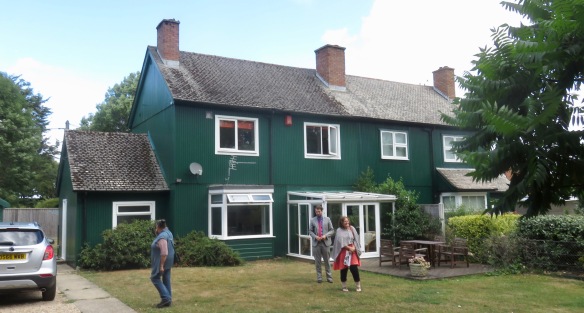

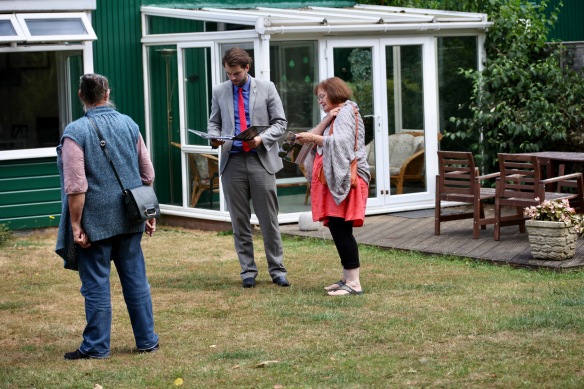
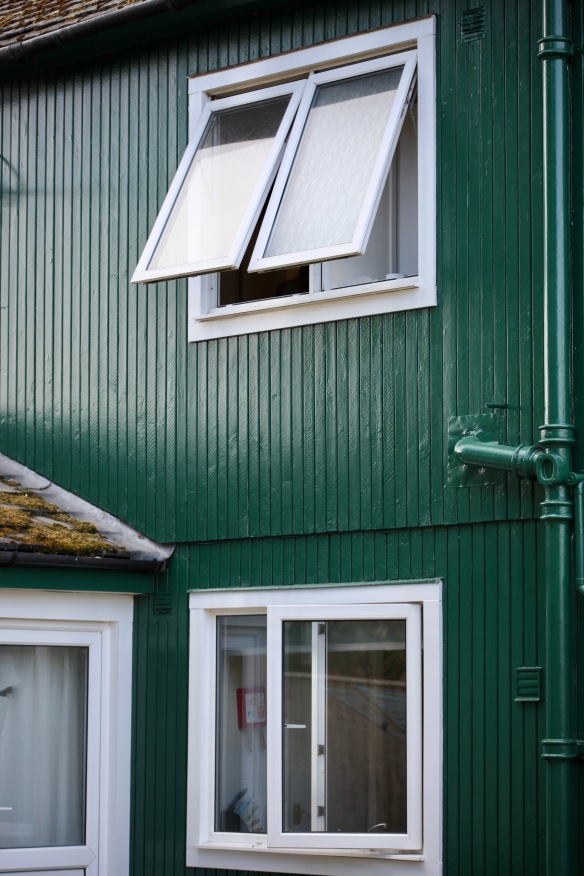
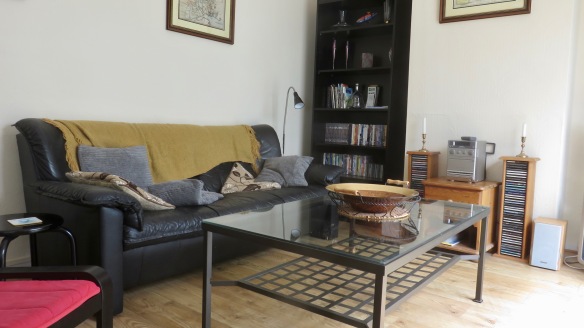
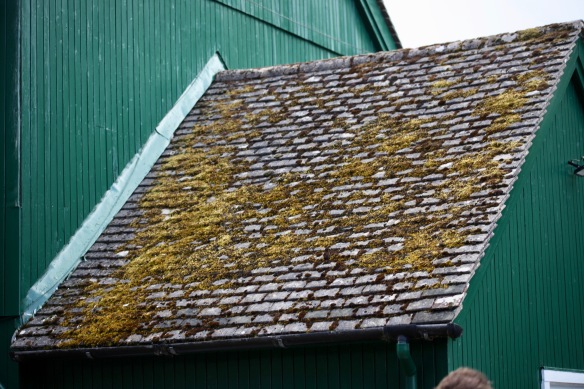


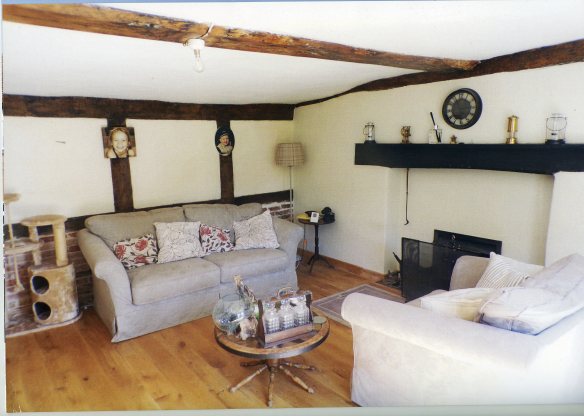
Oh my, how do you choose between two such interesting houses and histories and locations?
Such contrasts, Pauline. Either would be an exciting prospect. Thanks very much
Gosh, what a tough choice. I do love the floors in the beamed lounge.
Quite so, Jill. Thanks very much
They look well-preserved indeed Derrick.
Many thanks, Arlene. They were – and so different
Each is very interesting and so distinctive–they might have to make it a double and get both!
Thanks a lot, Donnalee. Quite so.
I can’t imagine trying to put that house together, I struggle with flat-pack furniture.
When I was a boy my grandparents lived in London, I was always intrigued by the pre-fab houses that seemed to be everywhere.
Many thanks, Andrew. In 1963, I was on the verge of buying a pre-fab in Wimbledon, when I was offered the chance to buy an end of terrace Victorian house. This was my first purchase.
A good decision I guess?
Given that the house for which I paid £2,500 is no doubt now worth more than a million, I guess so.
It was fascinating to read about the Swedish houses, Derrick. I think the second house is lovely…that lounge looks comfortable and inviting.
Thanks very much, Jane. I will report further on the searches as and when
Love that bit about British architectural history.
Me, too, Rosaliene. Thanks very much
What fabulous information. I love both houses, and the history behind them. The yellow felt really intrigues me. But then steak and Otter ale pie intrigues me too haha.
We were speculating about whether that felt was still intact. The pie was wonderful – thick and juicy; meat tender; pastry firm and crisp. Otter is the name of a beer, by the way 🙂 Thanks very much, Luanne
Yes, I looked that up about the beer. I figured as much, especially since you (grateful for that) capitalized Otter.
🙂
Both houses with historic interest. Good luck to Elizabeth!
Thanks very much, Merril
Happy explorations Derrick 💛.
Thanks very much, Val
I especially love the hunter green.
Thanks very much Cathi. That is apparently the original colour, and our mother’s maiden name was Hunter
Cool!
Thanks for sharing – a peep into the history. HARBANS
Thank you very much, Harbans
My pleasure sir.
Wonderful history and wonderful homes! Thank you!
Thanks very much, Gael
A fascinating travelogue of your day, Derrick. You’d be good as an estate agent.
Many thanks, Roland. I’d have to learn to be more devious 🙂
At least one suburb of Nottingham has prefab houses from the post war period and people fought tooth and nail for them when the council suggested they be knocked down. And they won! They look really quite ordinary, nothing like as splendid as the Swedish houses you viewed.
I almost bought a Wimbledon prefab in 1963. The Swedish houses are palaces in comparison. Thanks very much, John
The first house is so beautiful! It looks well taken care of!
I love touring inside houses, especially older ones. And I have a fascination with architecture and enjoy learning about when and how buildings were built!
Continued best wishes to Elizabeth in her house-hunting!
HUGS!!! 🙂
Thanks a lot, Carolyn. Will pass on your good wishes. X
One of the ditties dad recited which still sticks is
Down in the jungle
Living in a tent
Cheaper than a prefab
No rent
No idea where that came from! Thanks for generating a memory
🙂 My pleasure, Geoff. And thanks to you
I enjoy historic houses. Nice post.
Thanks very much, Sherry
Those are both fascinating houses. The longevity of the older one could be a concern though. I am surprised by the string of pony-pulled carts. I guess they are preferred for their vintage charm.
The carts must have been on their way to a show. Thanks very much, Uma
So many beautiful pictures–you spoil us. I am most interested in the pre-fab houses from Sweden after the war. Great history I did not know about
Nor me, and I have often seen the houses. Thanks very much, Pleasant
I am fascinated by these ‘pre-fabs’ gifted by England. So practical! What I remember about English housing (during the 1970s) is the lack of central heating, and the dampness I experienced in my relatives” homes. I was freezing cold in the middle of summer! Of course, all that has changed, I’m sure. But how welcome these warm and cozy houses must have been after the war!
They must have been really wonderful – still are. Thanks very much, Diane
We saw a pre-fab house at Avoncroft Museum in Bromsgrove (http://www.avoncroft.org.uk/). I don’t think it was as well appointed as the one you looked at 😊
Certainly not. These Swedish ones are so much better. Many thanks, Helen
I don’t know who produced the one at the museum.
Nor me. They were very widespread and good for their purpose – just not the same as the Swedish ones
Indeed!
Both are very interesting in their own way.
They are. Thanks very much, Inese
Oh, such an exciting time for Elizabeth; she is imagining her future. Best of luck to her in her search for a new home. Looking forward to sharing her journey through you.
I love the historical info, Derrick. Our house is very old (for the USA) – I think 150 years but it could be more, I forget.
Thanks very much, Jodie. I’m pleased that your house has history, too
Yes, I need to reacquaint myself with the particulars. The original house had no bathroom or kitchen, and only a ladder into the basement. (I see the patch where the floor was fixed over the hole.) We’re doing better, these days.
A very beautiful quandary you are experiencing Derrick, those house, especially the Swedish ones look great and fit in with the local ambiance. Your rural pictures show a lifestyle to be treasured.
Very many thanks, Ian
Thanks for the history lesson Derrick. Here in the states we learn about the USA role in WW2 but we are never taught about the reconstruction of Europe. This was very interesting.
Many thanks, Drew. I’m pleased it interested you
“Swedish government for Britain’s support during the war.” ❓ ❓
Strange, Sweden was supposedly a neutral country during WWII, For the life of me I can’t think what support we gave them, Norway was a different matter,
I can only think that the fact that we took on the Germans was supportive to the whole of Europe. As for Norway https://derrickjknight.com/2013/12/06/a-gift-from-norway/ Thanks very much, Brian
I doubt it was a guilty conscience, A bit like the Irish
I best Jackie and Elizabeth would have a field day in that garden! I was just binge watching Monty Don and thinking about your garden the whole time. I truly am inspired. I hope to one day have a beautiful place such as yours for my husband to decompress.
bet*
Let’s hope so. Thanks very much, Lisa
Both look equally enticing. I find the first one interesting in the fact that it is preserved from future development although the second looks slightly more rustic for the internal architecture and therefore closer to my heart.
Thanks very much, Geetha. Your analysis is good. What clinched the choice were the respective environments, price, and the amount of work needed.
Welcome Derrick. I am sure the choice was wise
My father was from Sweden. I’ll take the first house please and could it be assembled here in the south of France? 😊
Thanks very much, Léa. The first house was chosen, so you can’t have it 🙂
You are a tease! 😁 I shall just have to stay where I am…
🙂
Thanks very much, Jill
What an interesting post, Derrick. Two houses of significant architectural and historical interest. Thanks for sharing.
Many thanks, Cynthia
The house in Eling is our home. We love the uniqueness and character of it. I came across your post as I’m trying to find out more about the history of this beautiful cottage 😊
Pleased to hear this, Laura. Good to learn what happened.